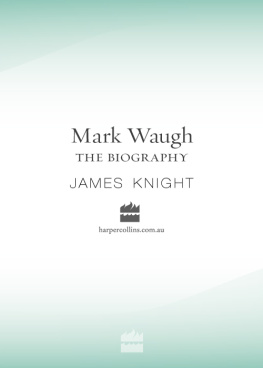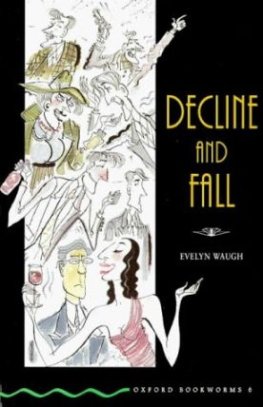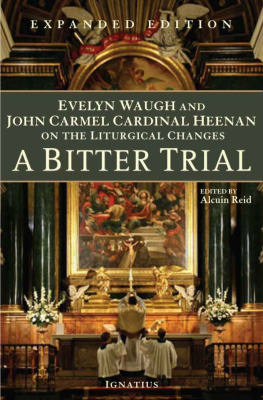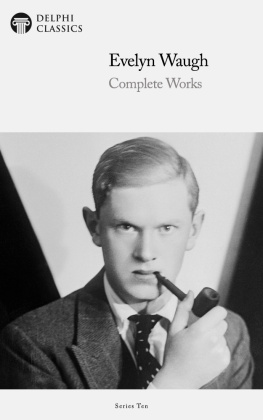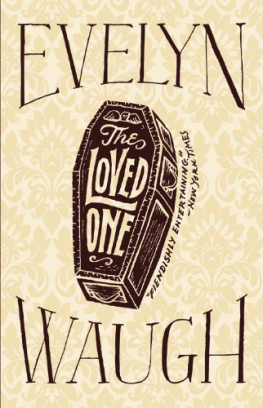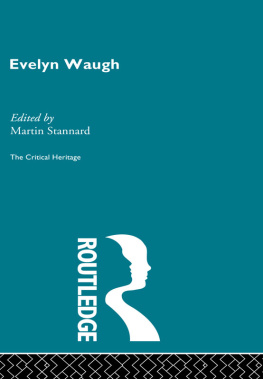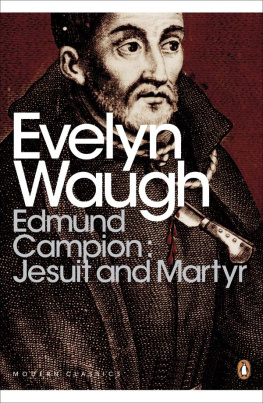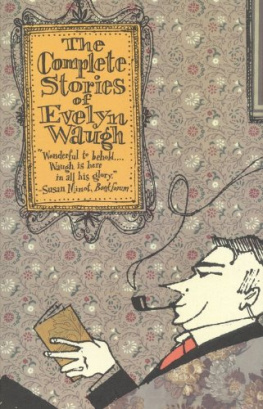MY BROTHER EVELYN & OTHER PROFILES
by
ALEC WAUGH

Contents
Foreword
In 1962 I published a partial autobiography, under the title The Early Tears of Alec Waugh. I was born in July 1898 and the book took me up to the summer of 1930. It told how I had become the kind of person that I am, restless, rootless, eager for change, avid of the sun, finding his plots between Capricorn and cancer. The year 1930 was a watershed for me. It marked the end of a major love affair, and the success in America of a travel book Hot Countrieswhich was a Literary Guild selectionintroduced me to the United States. From that point on, my professional base began to shift from London to New York.
One or two of the reviewers of The Early Years were kind enough to express the hope that I should write a sequel. Perhaps I shall, one day. But this is not that book, although it is reminiscent and told in the first person. Its I is the observer and the commentator, the raisonneur. The book is an attempt to present a picture of the English literary world as I have known it, through a series of portraits of some of the men and women who comprised it. Where I have been autobiographical, it is only because certain of my experiences as a writer illustrate my general thesis.
It is in no sense comprehensive. A number of prominent writers have been omitted, even though I may have known them; but I think that each of the portraits will be found to illustrate and interpret one aspect or another of the writers life. It takes all sorts to make a world, and the literary world with its excitement and its monotony, its sudden changes of fortune; its rich rewards, its bitter disappointments; its salutations in the market-place, its essential loneliness; its precariousness, its penury; its deep personal satisfaction from doing in ones own time, in ones own way, what one enjoys doing mostpresents an infinite scope for drama. I hope that these pages will give the reader some concept of that scope.
Most of these portraits were sketched separately at different times; some of them have appeared in magazines, some were originally intended for inclusion in The Early Years, but in the end did not seem to fit satisfactorily into its pattern. For the convenience of the reader one or two of the chapters have been dated.
1
Cousin Edmund
SIR EDMUND GOSSE
My first novel was published in July 1917, so that I have been part of the literary scene for half a century, but I have been an observer of it for a good deal longer, through my father, Arthur Waugh, who for forty years directed the fortunes of Chapman & Hall, Dickenss original publishers. My father has told his own story in One Mans Road; my brother Evelyn has told it in A Little Learning; I told it in my Early Years.
My paternal grandfather was a west country doctor, who hoped that his son would inherit his practice, but from early days it was obvious that by taste and temperament my father was unfitted for a life of medicine. He had a passion for books, for the library not the laboratory. At the age of twenty-three, having won the Newdigate Prize Poem at Oxford, he went up to London to earn his living with his pen.
He started his adventure without financial backing, but he had what was more valuable than capital, a blood relationship with Edmund Gosse. Gosse is far from forgotten, even now. Critical articles constantly refer to his writings and to his personality. His autobiography Father and Son is required reading. For over forty years he was influential in the world of letters. Nobody could have been better fitted to give a young man like my father his first chances.
The actual degree of cousinship between the Waughs and Gosses is a little distantmy great-grandmother was the first cousin of Edmunds fatherbut the links between the families have long been affectionate and close and they go back many years. My fathers mother spent part of her childhood in the same melancholy religious atmosphere which Edmund Gosse described in Father and Son. The Plymouth Brethren of this circle were, my father wrote, a desperately sincere but terribly depressing company whose principal interest was a lively and immediate expectation of the second coming. My grandmother recalled how Philip Henry Gosse would stand in the doorway, austere, solemn, confident, unwinding an interminable worsted scarf from about his neck and saying to her mother, Well, Cousin Anne, still looking daily for the coming of the dear Lord Jesus. Are not all the prophecies indeed fulfilled? The ominous decision would then go forth that the Lord would accomplish the number of his elect on Saturday afternoon at about three oclock. When Saturday afternoon came and waned to evening, without the expected event occurring, a new text was found next morning to justify the delay.
The young Edmund was brought at the age of seven, after his mothers death, for a visit to my grandmothers home. He seemed a precocious infant but she, several years his senior, was touched by the eagerness which was one of his greatest charms and used to tell how he knelt excitedly before a case of stuffed birds exclaiming with high pitched enthusiasm, Cousin, you have here a remarkable specimen of the Golden Oriole.
Max Beerbohm, in his series of cartoons, The young self meets the old self, drew Gosse in his last decade, surrounded by important friends, being startled by the unannounced invasion of that august assembly by a small earnest infant waving a flag and shouting Are you saved?
To the reader of today, Gosse is remembered in terms of those two selves: the young evangelist of whom he himself has drawn an unforgettable picture in Father and Son, and the doyen of letters whose legend has been enshrined in Osbert Sitwells Eminent Presences, Max Beerbohms A Christmas Garland and the imaginary conversations in Avowals with George Moore.
Gosse was the first important writer whom I met, yet it is with hesitation that I write of him. As a schoolboy I asked my father if he had ever met Oscar Wilde. He shook his head. No, and I only saw him twice. Once in London, when he put his head round the door at a party and said, I have come to tell you I cant come, secondly in Paris, after the scandal.
My father was in a caf, so he told me, with Sidney Pawling, Heinemanns partner, and Peter Chalmers Mitchell who directed the London Zoo and was subsequently knighted. Wilde came in, looked round him, then went out. Mitchell said, Thats Wilde. Ill go and speak to him. He was away ten minutes. On his return, he said, I dont see why you should cut a man because hes had a scandal. Ive no use for fairweather friends who drink a mans wine when hes in favour and look the other way when hes in trouble. He was so persistent and generally self-righteous that finally Pawling said, What are you making all this fuss about? Waugh doesnt know him. Ive scarcely met him. Dont be such an ass, Mitchell, finish up your beer.
That was the story as my father told it me. Many years later, in his autobiography My Fill of Days Mitchell described how he found himself in Paris with two quite nice people, one a stockbroker, the other a partner in a publishing house, both what may be called men of the world. On Wildes appearance, so Mitchell said, my friends got up to go. You can stay if you like, they said. He is probably here under a false name. The hotel should be warned. Mitchell said that he and Wilde talked for two hours.
Mitchell had the warmest affection for my father. He wrote a few pages later, Arthur Waugh is another of my lifelong friends for whom the years have done nothing worse than to silver his hair. By nature a poet, he is the rare combination of a man of letters and a man of business and has been one of the steady and beneficent forces in the English literature of our time. He had clearly forgotten that my father was in his company that evening.


